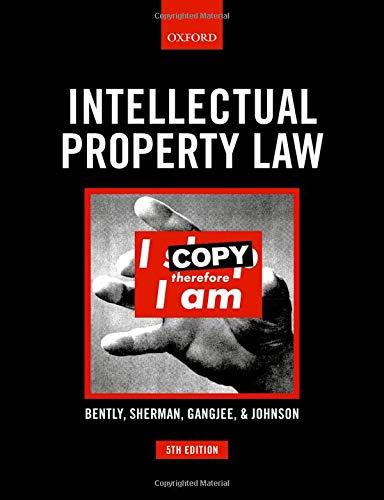Question
Company Law Questions Question 1 Partners are in a fiduciary relationship with each other. Explain and illustrate this concept. Also explain when the fiduciary relationship
Company Law Questions
Question 1
"Partners are in a fiduciary relationship with each other". Explain and illustrate this concept. Also explain when the fiduciary relationship may begin and when it ends.
Question 2
"In Salomon v Salomon & Co. Ltd [1897] AC22, Mr Salomon was very lucky. Today, on the same facts, he would be personally liable for the debts of the company, and the security (debenture) given to him by the company would be invalid as a priority over the unsecured creditors". Do you agree? Comments.
Salomon v Salomon
[4.33] Salomon v Salomon & Co Ltd [1897] AC 22 (House of Lords)
FACTS: Salomon had carried on a successful business as a sole trader for over 30 years. In order to provide for his sons who, "troubled him all the while" for a share in the business, he incorporated it as a company limited by shares. At that time the Companies Act required a company to have a minimum of seven subscribers (the people who signed the application for incorporation). These were Salomon, his wife and five of his adult children, each of whom subscribed for one share in the company. After the company was registered it allotted 20,000 shares to Salomon as part payment for the transfer of his existing business to the company. The remainder of the purchase price was owed to Salomon by the company and this loan was secured by a debenture: see Chapter 20. Thus, Salomon was a secured creditor of the company as well being the holder of almost all its shares. Although the business was now owned by the company, not by Salomon,there was no change in the way it was run, with Salomon continuing to make all the major decisions in the same way as he had done before he transferred the business to the company.
The business had been very prosperous but, shortly after it was sold to the company, it faced financial difficulties and was eventually put into liquidation: see Chapter 24. The company's assets were insufficient to pay both Salomon (as a secured creditor) and the unsecured creditors. The liquidator (acting on behalf of the unsecured creditors) argued that Salomon was not entitled to be treated as a secured creditor. He alleged that because Salomon was effectively in complete control of the company, the company was acting either as an agent or a trustee for him in running the business. In either case, Salomon would have been required to indemnify the company for the debts it incurred on his behalf and he certainly would not have been entitled to any priority over the unsecured creditors.
DECISION: The House of Lords held that, eventhough Salomon controlled the company, the company was a separate legal entity and it, not Salomon, was running the business so Salomon was entitled to recover the secured debt owed to him. Once a company was validly incorporated (today we say "registered") it became a separate legal entity and as Lord Macnaghten said (at 51):
the company is at law a different person altogether from the subscribers to the memorandum; and, though it may be that after incorporation the business is precisely the same as it was before, and the same persons are managers, and the same hands receive the profits, the company is not in law the agent of the subscribers or trustee for them. Nor are the subscribers as members liable, in any shape or form, except to the extent and in the manner provided by the Act.
Question 3
The Board of Directors of Lackcash ( a proprietary co) are considering the following options: (a) To raise capital of $6 million by an issue of shares to its shareholders; or (b) To utilise any method of obtaining the $6 million without contravening Ch 6D of the Corporations Act. Advise the Board of Lacklash Pty Ltd of the corporations law involved.
Question 4
With reference to case law and the Corporations Act 2001(Cth) describe what is meant by the term 'insolvency' and identify the link between 'voluntary administration', 'deeds of company arrangements' and 'liquidation'.
Question 5
"The law recognises a corporation as a distinct legal entity, having a separate existence and a corporate personality of its own, quite apart from the members who comprise it." Discuss this statement with reference to the main legal consequences both at general law and under the Corporations Act 2001 (Cth).
Question 6
Bob wants to assist a yet to be formed company to take advantage of lucrative contracts which need to be signed before the company is incorporated? Citing the relevant sections in the Corporations Act discuss whether or not Bob could be held liable if he signs a pre-registration contract.
Step by Step Solution
There are 3 Steps involved in it
Step: 1

Get Instant Access to Expert-Tailored Solutions
See step-by-step solutions with expert insights and AI powered tools for academic success
Step: 2

Step: 3

Ace Your Homework with AI
Get the answers you need in no time with our AI-driven, step-by-step assistance
Get Started


